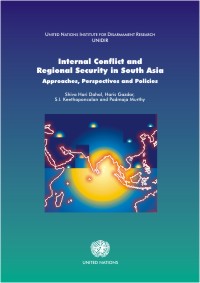South Asia is one of the most ancient, diverse and populous regions of the world. It is also a region that is rife with armed conflict, both internal and external. In all, these conflicts have seriously hindered the social, political and economic life of the region. Although often more obscure to the outside world, internal conflicts have exacted a particularly heavy toll. Tragically, many of these conflicts have proved extremely resistant to resolution efforts and have continued without abatement for decades.
In 2001, UNIDIR hosted four research fellows from South Asia: each from a different country in the region (India, Nepal, Pakistan and Sri Lanka) and each from a different academic discipline. The research produced in this book is the result of their six-month collaboration on the issue of the impact of internal conflicts on regional security in South Asia.
Internal conflicts are exceedingly difficult to address because they are typically highly complex. The protagonists are often heterogeneous, their motivations amorphous and, at times, foreign parties may also be involved. Moreover, internal conflicts tend to create a myriad of consequences that contribute to their own perpetuation. Common occurrences of internal conflict such as oppression, hardship, displacement and the creation of vested interests in violence only add to and deepen already existing cleavages. Finally, the scope for mediation in internal conflicts by well-meaning international actors or institutions is generally far lower than in the case of external conflict.
Internal Conflict and Regional Security in South Asia: Approaches, Perspectives and Policies examines the quandary of internal conflict in South Asia. Internal conflict is invariably related to the failure of existing institutions to mitigate differences among various segments of society. Conflict management entails the process of bringing these various segments into agreed institutional settings wherein authentic discussion of grievances can take place. The authors propose the formation of Peace Commissions at the national, sub-national and regional levels that could work in a similar fashion to the human rights commissions and assist the people who would otherwise resort to violent conflict.
Citation: Shiva Hari Dahal, Haris Gazdar, S.I. Keethaponcalan and Padmaja Murthy (2003). "Internal Conflict and Regional Security in South Asia: Approaches, Perspectives and Policies", UNIDIR, Geneva.
